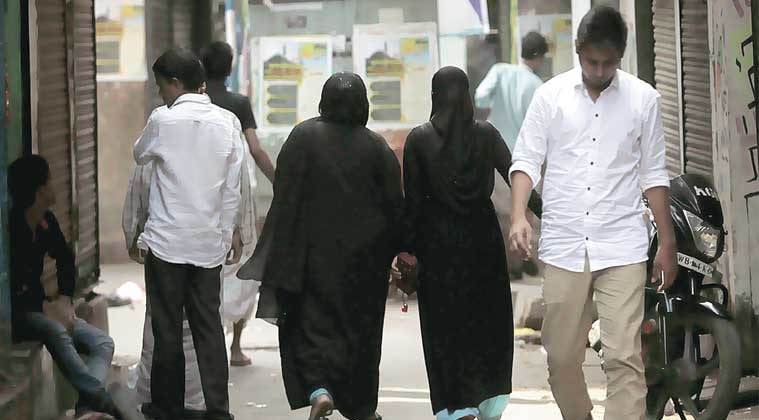“YOU DON’T LOOK MUSLIM AT ALL”: How urban neighbourhoods in Kolkata prevent Muslims from being part of the city’s heterogeneous spaces
A few weeks back, I was at a neighbour’s place chatting with a couple and their teenage daughter. The 14-year-old studies in a renowned south Kolkata school.
They are among the “lucky” Muslims, they told me, because their daughter’s friends visit their home, she visits her friends’ homes, all of them have been “allowed” to participate in the neighbourhood Durga Puja. “But…” they said. And there were many stories that began with “but…”
“But, a couple – our neighbours – once came to invite us for their son’s wedding, and when I offered them water, they jumped up from the couch and were about to leave,” Aminah told me.
The separation of the Muslims from the Hindu mainstream in urban and rural India is taking place in more ways than one. What does it mean to be a Muslim in a predominantly Hindu neighbourhood in a metropolis? There is always a forceful resistance to push the Muslims from being part of the city’s heterogeneous spaces. This is primarily the reason they are forced to come together, form and live in exclusive ghetto-like spaces.
In the upper and middle class neighbourhoods of big and small cities in today’s India – and even in Kolkata, which is known to be more tolerant than many other Indian cities – the social marginalisation of Muslims is no longer subtle.
Aminah’s husband, Rafique, says that recently while hiring an office space, he had told the landlord quite clearly, “Ami kintu musholmaan” (let me tell you that I am a Muslim). “It’s best to ‘warn’ him before he objects to renting it out on such grounds,” Rafique said. It is well known by now that Muslims find it hard to rent or buy homes in predominantly Hindu neighbourhoods of Indian cities. Kolkata is no exception.
Aminah says that her neighbours often tell her that she doesn’t “look Muslim”. “’Your look Hindu, Brahmin’, I am told”, she says laughing. “What does that mean? Do I have to be dirty, wear a burqha in order to look Muslim?” she asks.
Such stereotyping – despite coming from widely varying socio-economic backgrounds – continues to exist. In fact, it has become far worse in recent times, due to the insecurity in the minds of the majority that comes from the country’s current climate of intolerance and distrust towards the Muslim minority.
Aminah and Rafique find it hard to get a cook for their home, and the cooks they have hired over the years don’t find similar jobs in other flats. “Boudi, tomar bari theke beriye amay Dettol diye dui haat dhutey hoy,” the Hindu domestic workers tell them (I have to wash both hands with disinfectant after I leave your house).
Their daughter has friends who have never had any issues about her being a Muslim, they say, though Rafique says “her name doesn’t make people identify her as a Muslim. It was a conscious decision when we chose her name”. They tell me that none of her friends have bullied her. “Only, on some occasions she was asked if she eats beef”, Aminah tells me.
All this doesn’t hurt, Aminah and Rafique say, because they have heard worse stories, and therefore consider themselves lucky in comparison.
Nazia Erum, in her recent book, Mothering A Muslim (read excerpt here), talked to over a hundred children and their parents across twelve cities and wrote about religious segregation in classrooms and bullying of Muslim children in some of the top schools in India.
Nazia says that when she had a child, she felt the absence of the narrative of Muslim mothers around. “I spoke to my counterparts, and I could relate to them on a number of things,” she said. “The year was 2014. And our country stood divided along religious fault lines. Within the minority Muslim population, a fear was palpable,” Nazia wrote in her book.
***
Sabir’s children study in a top missionary school in Kolkata. He works in one of the most renowned media houses in the city. People recognise him as a journalist because he appears on television so often. Yet, Sabir and his family members have faced scores of rejections in various parts of south and central Kolkata while looking for a flat they wanted to buy. Sabir has often been asked, “How do you speak such fluent Bengali despite being a Muslim? Do you speak Urdu at home?”
“I have to explain to them that I am Muslim by religion. But I am a Bengali. I can’t read, write or speak Urdu,” he says. While he has faced such bizarre questions since childhood, Sabir admits the situation has turned increasingly volatile in schools now.
He tells me about a child in his extended family who was told, “You Muslims eat beef and you people marry so many times.” In his extended family, a six-year old boy (who studies in a renowned Kolkata school) cried incessantly at home because a friend in school wasn’t willing to share lunch because he was Muslim.
***
It hurts, though all injuries aren’t expressed in the form of anger or tears.
Aminah offers me tea. It was 9.30 pm. I can drink tea any time of the day and at any time of the night. And it was Darjeeling tea. How could I refuse? But when I say “yes”, she regrets having told me the story of the neighbours who had refused to touch water at their place. Aminah thinks I am going out of the way to drink tea at her place because she told me that story.
The scourge of suspicion and mistrust is upon us.

